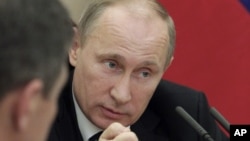MOSCOW —
A new law expanding the definition of high treason in Russia is in effect. Critics say it gives the government broad authority to brand anyone as a traitor, a charge that carries up to 20 years in prison.
Revised definition
The new law states anyone who possesses information deemed secret could be jailed for up to eight years for espionage - even if the secrets are not passed to foreign hands. Critics say the new law does not require authorities to prove a suspect damaged state security.
Previous legislation described high treason as espionage or assistance to a foreign state that damages Russia’s external security. As part of the new law, which was drafted by Russia’s Federal Security Agency, “external” has been dropped from the definition. As a result, activists who get help or advice from a foreign state or give information to foreign organizations, including journalists, could be charged with treason.
Opposition reacts
The critics say the law is so vague anyone could be charged.
Russian opposition leader Boris Nemtsov maintains the Kremlin is passing many new laws in an attempt to silence dissent.
He says authorities are terribly afraid of their own people; scared that people can say "no" to government officials. And he says they have decided to use measures that include unlawfully putting people behind bars. Nemtsov says he is categorically against that.
The maximum sentence for anyone convicted of treason remains 20 years.
Since Russian President Vladimir Putin came to power for an unprecedented third term in May, Russia has seen a crackdown on the opposition. Fines for participating in or organizing unsanctioned protests against the Kremlin have increased more than 150-fold.
New requirements for NGOs
Non-governmental organizations that receive foreign funding and engage in political activity are now required to register as foreign agents, a term that stems back to Soviet times.
The U.S. Agency for International Development (USAID) was forced to close its doors after more than 20 years of working to create a civil society in Russia. The Kremlin claimed the organization was trying to use its money to influence politics in the country. Washington denies the claim.
The revised treason bill first came up in 2008, during then-President Dmitry Medvedev’s term. He quickly shelved the bill after public criticism.
Earlier this week, Putin said he would take another look at the treason bill to make sure it was not excessively broad. Despite the promise, the bill took effect Wednesday.
The Kremlin says many of the new laws that have taken effect since Putin came into office are merely meant to strengthen security and keep the public safe.
Revised definition
The new law states anyone who possesses information deemed secret could be jailed for up to eight years for espionage - even if the secrets are not passed to foreign hands. Critics say the new law does not require authorities to prove a suspect damaged state security.
Previous legislation described high treason as espionage or assistance to a foreign state that damages Russia’s external security. As part of the new law, which was drafted by Russia’s Federal Security Agency, “external” has been dropped from the definition. As a result, activists who get help or advice from a foreign state or give information to foreign organizations, including journalists, could be charged with treason.
Opposition reacts
The critics say the law is so vague anyone could be charged.
Russian opposition leader Boris Nemtsov maintains the Kremlin is passing many new laws in an attempt to silence dissent.
He says authorities are terribly afraid of their own people; scared that people can say "no" to government officials. And he says they have decided to use measures that include unlawfully putting people behind bars. Nemtsov says he is categorically against that.
The maximum sentence for anyone convicted of treason remains 20 years.
Since Russian President Vladimir Putin came to power for an unprecedented third term in May, Russia has seen a crackdown on the opposition. Fines for participating in or organizing unsanctioned protests against the Kremlin have increased more than 150-fold.
New requirements for NGOs
Non-governmental organizations that receive foreign funding and engage in political activity are now required to register as foreign agents, a term that stems back to Soviet times.
The U.S. Agency for International Development (USAID) was forced to close its doors after more than 20 years of working to create a civil society in Russia. The Kremlin claimed the organization was trying to use its money to influence politics in the country. Washington denies the claim.
The revised treason bill first came up in 2008, during then-President Dmitry Medvedev’s term. He quickly shelved the bill after public criticism.
Earlier this week, Putin said he would take another look at the treason bill to make sure it was not excessively broad. Despite the promise, the bill took effect Wednesday.
The Kremlin says many of the new laws that have taken effect since Putin came into office are merely meant to strengthen security and keep the public safe.
